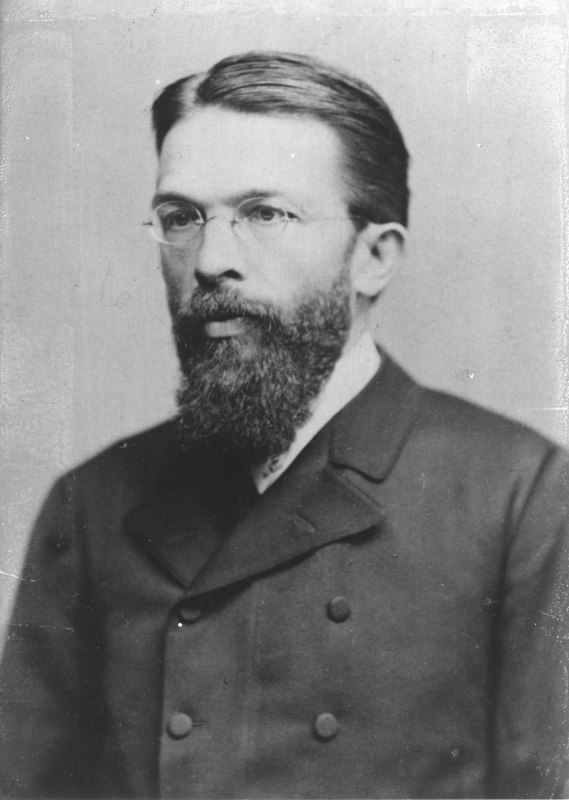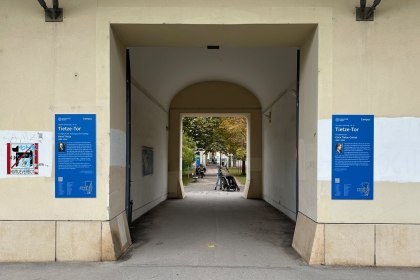Carl Menger von Wolfensgrün, Prof. Dr.
Brother of the lawyer Anton Menger, father of the mathematician Karl Menger
Founder of the "Austrian School of Economics"
"Carl Menger's monetary theory, which sees money as the most exchangeable of all goods, is of lasting importance: to this day, it is the most frequently used consideration in the exchange of goods and thus the most marketable of all goods."
Erich Streissler, Emeritus Professor of Economics, Econometrics and Economic History at the University of Vienna
Honors
| Ehrung | Titel | Datierung | Fakultät | |
|---|---|---|---|---|
| Honorary Doctorate | Dr. jur. h.c. | 1909/10 | Faculty of Law and State |
|
| Honorary Doctorate | Dr. rer. pol. h.c. | 1919/20 |
|
|
| Monument in arcaded court | 1929 | Faculty of Law and State |
|
|
| Commemorative Plaque of Faculty | 1950 | Faculty of Law and State |
Rektor Richard Meister regte im Oktober 1949 an, wieder Namen von berühmten Mitgliedern des Lehrkörpers in die Ehrentafeln der Fakultäten im Hauptgebäude der Universität Wien einzutragen. Zu diesem Zweck ersuchte er die Dekane, diese Frage in einer Fakultätssitzung zu besprechen und dem Senat Vorschläge zu unterbreiten. Der Dekan der Rechts- und Staatswissenschaftlichen Fakultät Johann Schima schlug entsprechend eines Beschlusses des Professorenkollegiums vom 28. Jänner 1950 vor, Lorenz von Stein, Eugen von Böhm-Bawerk, Leopold Pfaff, Karl Menger und Karl von Inama-Sternegg für die Eintragung auf der Ehrentafel vorzuschlagen. Die Vorschläge der Dekanate wurden in der Sitzung des Akademischen Senats vom 4. März 1950 vorgelegt und einstimmig angenommen. Am 25. März 1950 wurde der Auftrag zur Eingravierung und Vergoldung von 21 Namen auf die vier Ehrentafeln der Fakultäten erteilt und im Mai 1950 umgesetzt. |
|
| Gate of Remembrance | Menger-Tor | 1998/99 |
|
Functions
| Dean | Faculty of Law and State | 1881/82 |
| Dean | Faculty of Law and State | 1888/89 |
- National Economics
- Economics
- Political Economy
- Economic Sciences
- Faculty of Law and State
Carl Menger came from a family of Austrian civil servants and officers. He studied at the universities of Vienna, Prague and Krakow and was awarded a doctorate in law in 1867.
He then joined the civil service, where he had the opportunity to make economic observations. One of his tasks was to write overviews of the state of the markets for the "Wiener Zeitung". Based on his reflections on price formation, he arrived at theoretical insights, which he published in 1871 in his work "Principles of Economics". Hardly ever has a first work had such a lasting effect. With this book, the author founded the Austrian School and its unique position in the development of economics.
One year after the publication of the "Principles", Carl Menger was able to qualify as a professor of political economy at the University of Vienna. He was appointed associate professor of economics in 1873 and full professor in 1879 at the University of Vienna, where he worked until his early retirement in 1903 at his own request. He declined appointments at foreign universities.
In addition to the "Principles", his main works include the book "Investigations on the Method of the Social Sciences and Political Economy in Particular" (1883), in which he represented the viewpoints of theoretical research in the methodological dispute with the "historical school" that prevailed in Germany. In 1876, Carl Menger was also appointed one of the teachers of Crown Prince Rudolf, with whom he undertook extensive study trips through Europe in 1877 and 1878.
Carl Menger received many honors and awards; in 1900 he was appointed a life member of the House of Lords.
The University of Vienna honored him with an entry on the honorary plaque of the Faculty of Law and Political Science, the award of an honorary doctorate, the erection of a memorial in the arcaded courtyard of the main university building and the naming of a "Gate of Remembrance" on the campus of the University of Vienna after him and his son Karl Menger in 1998.
Archive of the University of Vienna, Academic Senate, GZ 6 ex 1949/50 (Roll of Honor); Faculty of Law and Political Science GZ 2625 ex 1949/50 (Roll of Honor).
Zuletzt aktualisiert am 03/01/24




